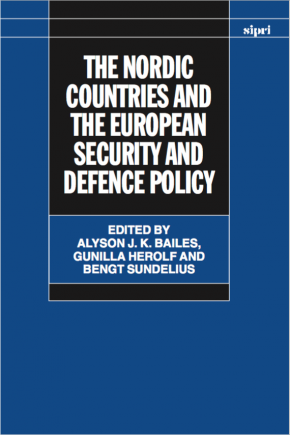The Nordic Countries and the European Security and Defence Policy

A special feature of Europe's Nordic region is that only one of its states has joined both the European Union and NATO. Nordic countries also share a certain distrust of approaches to security that rely too much on force or that may disrupt the logic and liberties of civil society. Impacting on this environment, the EU's decision in 1999 to develop its own military capacities for crisis management—taken together with other ongoing shifts in Western security agendas and in USA–Europe relations—has created complex challenges for Nordic policy establishments.
This multi-author book combines the techniques of reporting and analysis, debate and prediction, to illuminate the consequences of these challenges for the five Nordic countries, Denmark, Finland, Iceland, Norway and Sweden. The views expressed in it by Nordic and non-Nordic, younger and more established, analysts reflect the political and intellectual ferment triggered in the Nordic region by these developments—in the process shedding light on defence and security challenges that matter deeply for Europe as a whole.
Introduction. The European defence challenge for the Nordic region
Alyson J. K. Bailes
Part I. Institutional and national politics
Editor's remarks
Gunilla Herolf
1. Denmark and the European Security and Defence Policy
Klaus Carsten Pedersen
2. The Nordic countries and the EU–NATO relationship
Teija Tiilikainen
3. The Nordic countries and the EU–NATO relationship: Further comments
Gunilla Herolf
4. Domestic influences on Nordic security and defence policy: From the perspective of fusion
Lee Miles
5. The domestic background: Public opinion and party attitudes towards integration in the Nordic countries
Cynthia Kite
Part II. National defence and European cooperation
Editor's remarks
Bengt Sundelius
6. The impact of EU capability targets and operational demands on defence concepts and planning
Gerrard Quille
7. The impact of EU capability targets and operational demands on defence concepts and planning: The case of Sweden
Lars Wedin
8. 'Not only, but also Nordic': The European Security and Defence Policy and its implications for alternative frameworks of Nordic cooperation
Jesper L. Christensen
9. Hardware politics, 'hard politics' or 'where, politics?': Nordic defence equipment cooperation in the EU context
Björn Hagelin
10. The Nordic attitude to and role in EU-linked defence industrial collaboration
Michael Brzoska
Part III. Nordic handling of the broader dimensions of security in an EU setting
Editor's remarks
Alyson J. K. Bailes
11. Starting to 'think big': The Nordic countries and EU peacebuilding
Maria Strömvik
12. 'The higher cause of peace': What could and should the Nordic countries contribute to the development of conflict mediation in the EU context?
Tarja Väyrynen
13. The Nordic countries and conventional arms control: The case of small arms and light weapons
Nicholas Marsh
14. Nordic nuclear non-proliferation policies: Different traditions and common objectives
Lars van Dassen and Anna Wetter
15. The interface of external and internal security in the EU and in Nordic policies
Magnus Ekengren
16. Muddling through: How the EU is countering new threats to the homeland
Anja Dalgaard-Nielsen
Part IV. The Nordic countries, their region and Europe: Additional perspectives
Editor's remarks
Alyson J. K. Bailes
17. The Nordic countries and EU security policy: Convergent or divergent agendas?
Pernille Rieker
18. The will to defend: A Nordic divide over security and defence policy
Tarja Cronberg
19. The Norwegian predicament in European defence: Participation without direction
Nils Morten Udgaard
20. Iceland and the European Security and Defence Policy
Alyson J. K. Bailes and Baldur Thorhallsson
21. Åland in European security policy
Teija Tiilikainen
22. The Baltic states and northern security
Karlis Neretnieks
23. Baltic perspectives on the European Security and Defence Policy
Elzbieta Tromer
Appendix. Extracts from the Treaty Establishing a Constitution for Europe

